实验3:OpenFlow协议分析实践
实验3:OpenFlow协议分析实践
一、实验目的
- 能够运用 wireshark 对 OpenFlow 协议数据交互过程进行抓包;
- 能够借助包解析工具,分析与解释 OpenFlow协议的数据包交互过程与机制。
二、实验环境
Ubuntu 20.04 Desktop amd64
三、实验要求
(一)基本要求
/home/用户名/学号/lab3/目录下的拓扑文件:
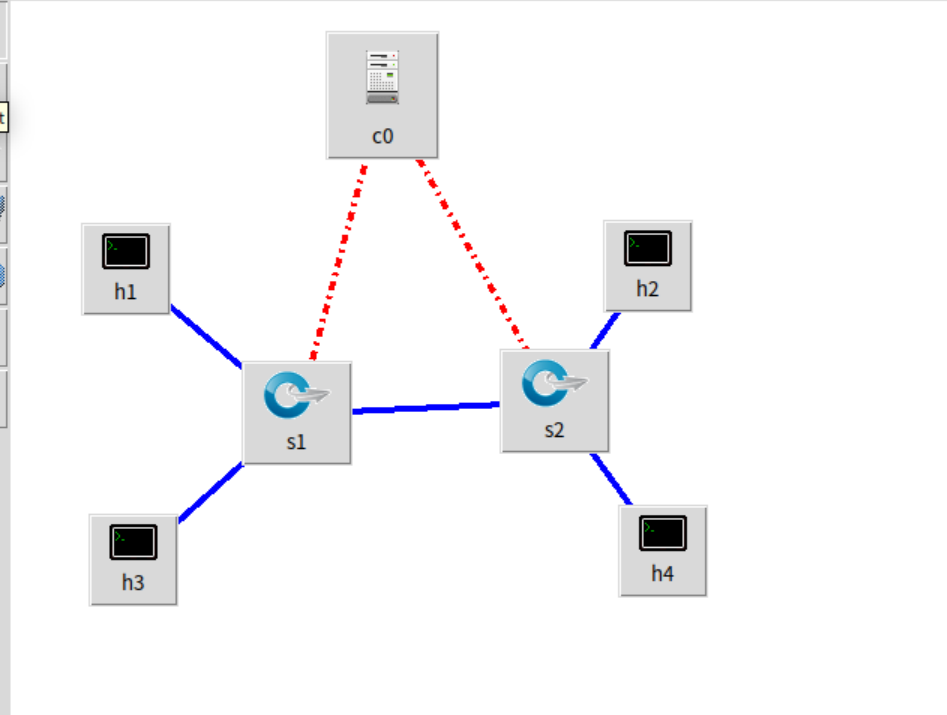
| 1.hello |
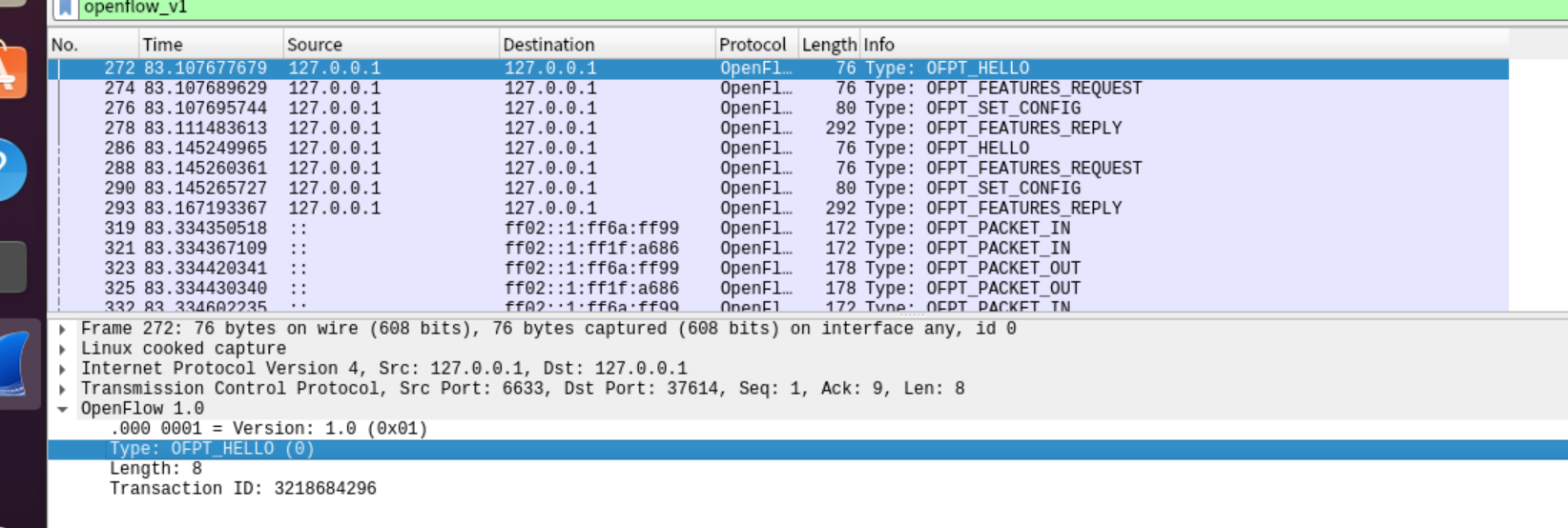
交换机37614端口(我最高能支持OpenFlow 1.3) ---> 控制器6633端口
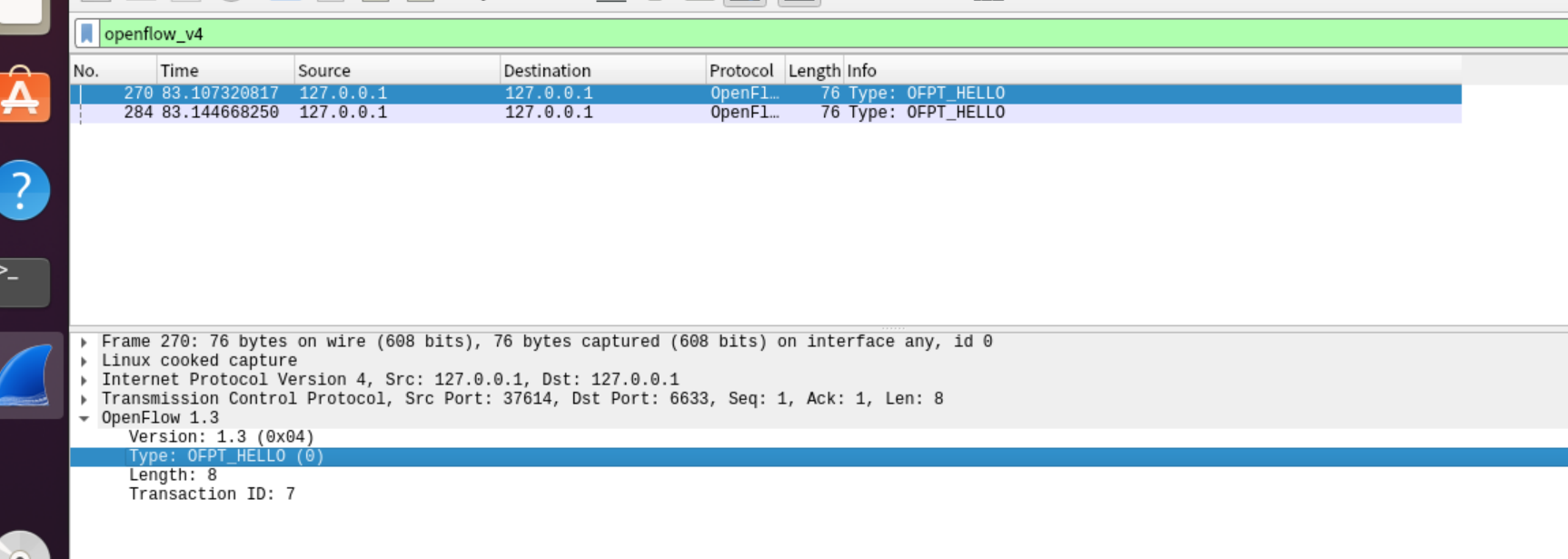
于是双方建立连接,并使用OpenFlow 1.0
| 2.Features Request / Set Conig |

控制器6633端口(请按照我给你的flag和max bytes of packet进行配置) ---> 交换机37614端口
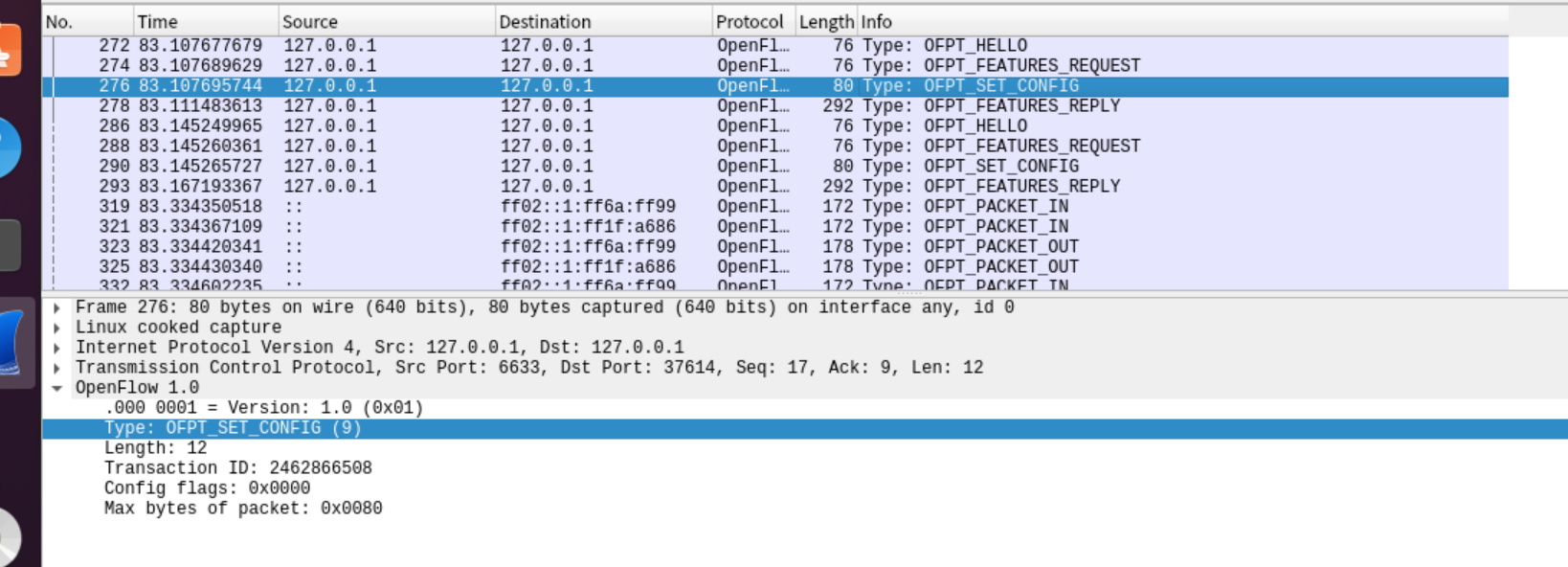
| 3.Port_Status |
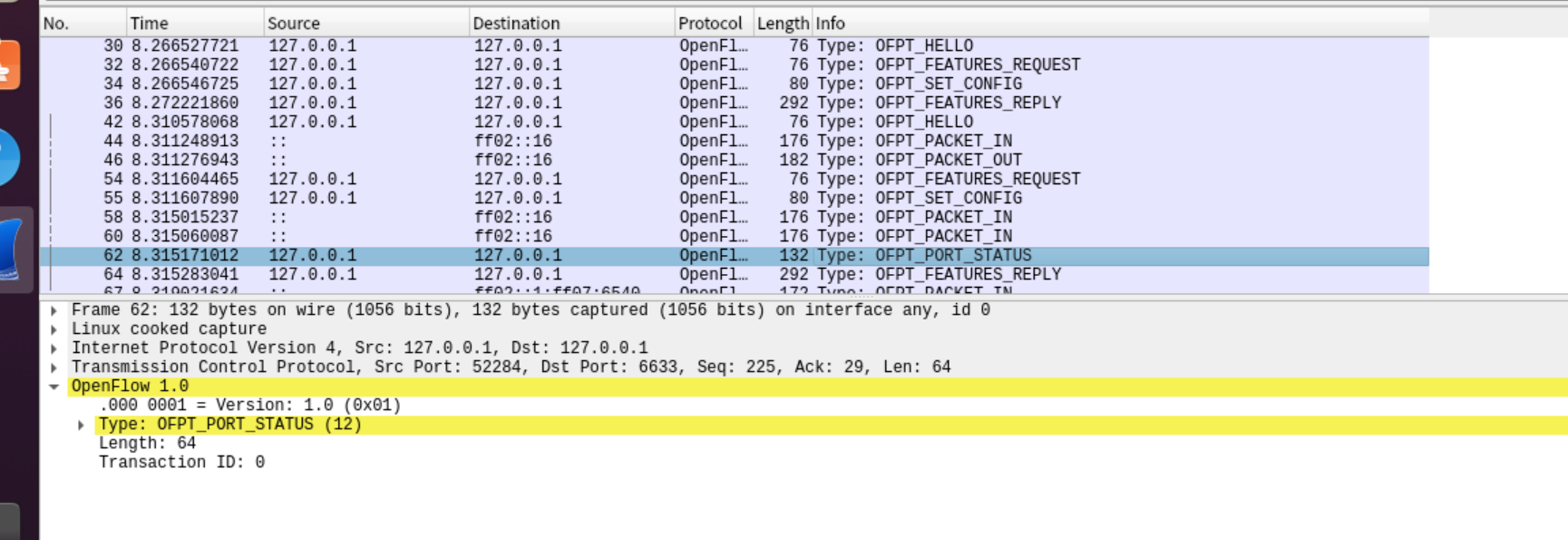
| 4.Features Reply |
交换机37614端口(这是我的特征信息,请查收) ---> 控制器6633端口
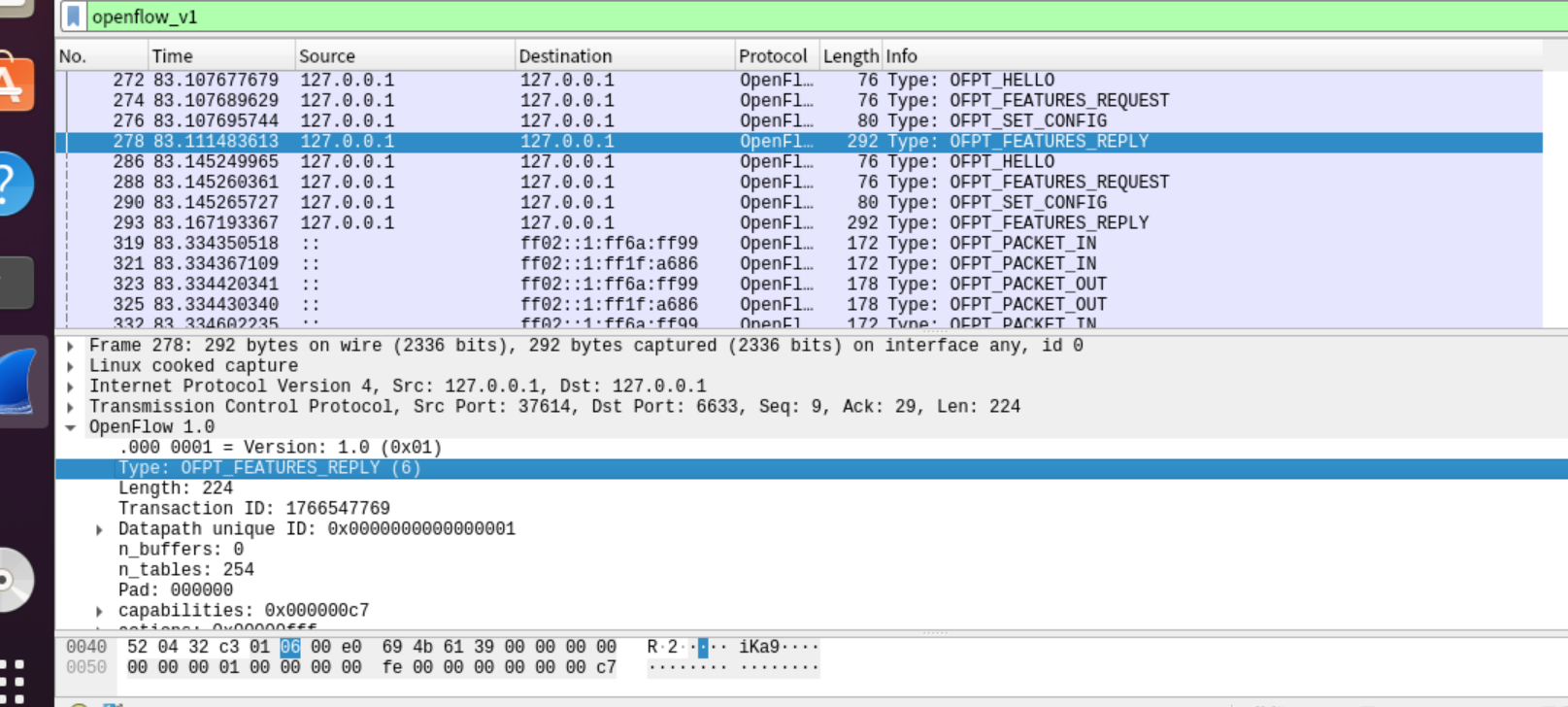
| 5.Packet_in |
- 有两种情况
- 交换机查找流表,发现没有匹配条目时
- 有匹配条目但是对应的action是OUTPUT=CONTROLLER时
交换机37616端口(有数据包进来,请指示)--- 控制器6633端口
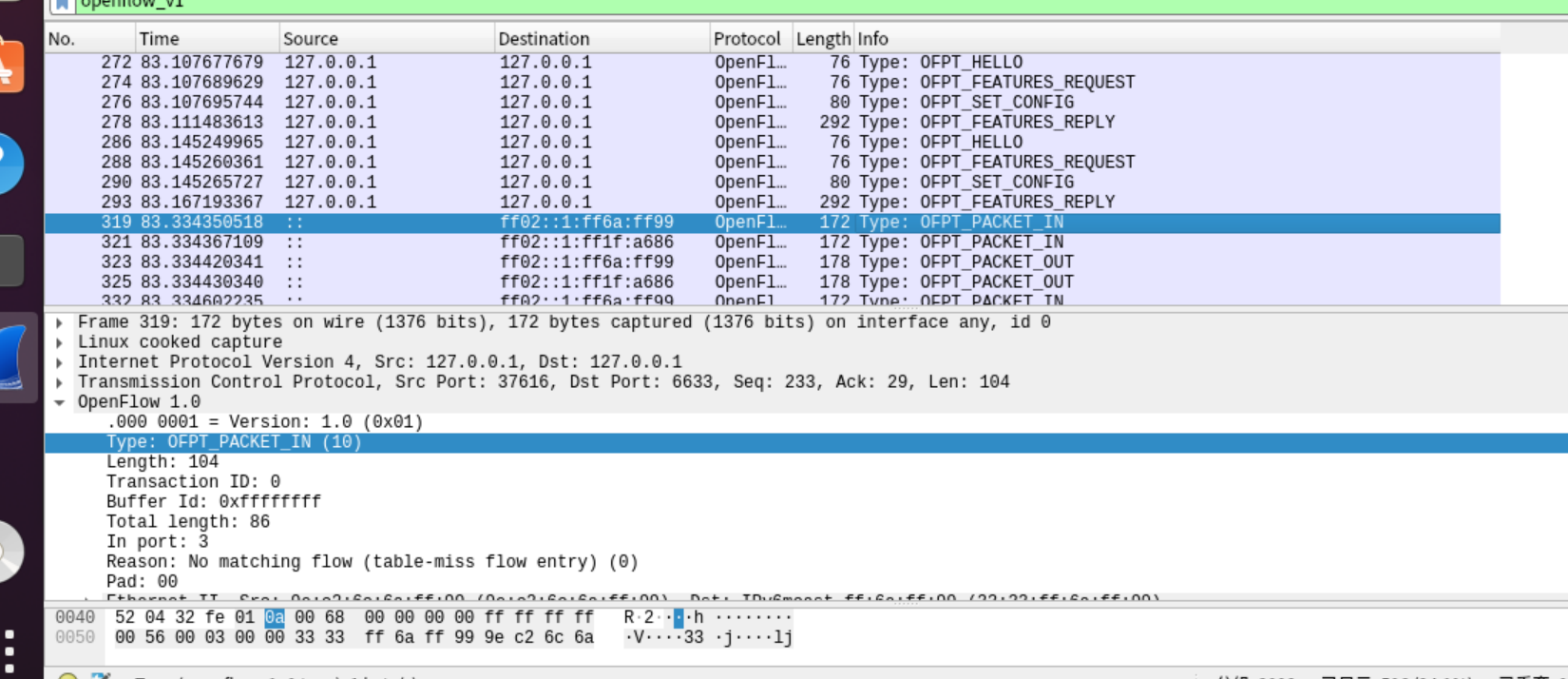
| 6.Packet_out |
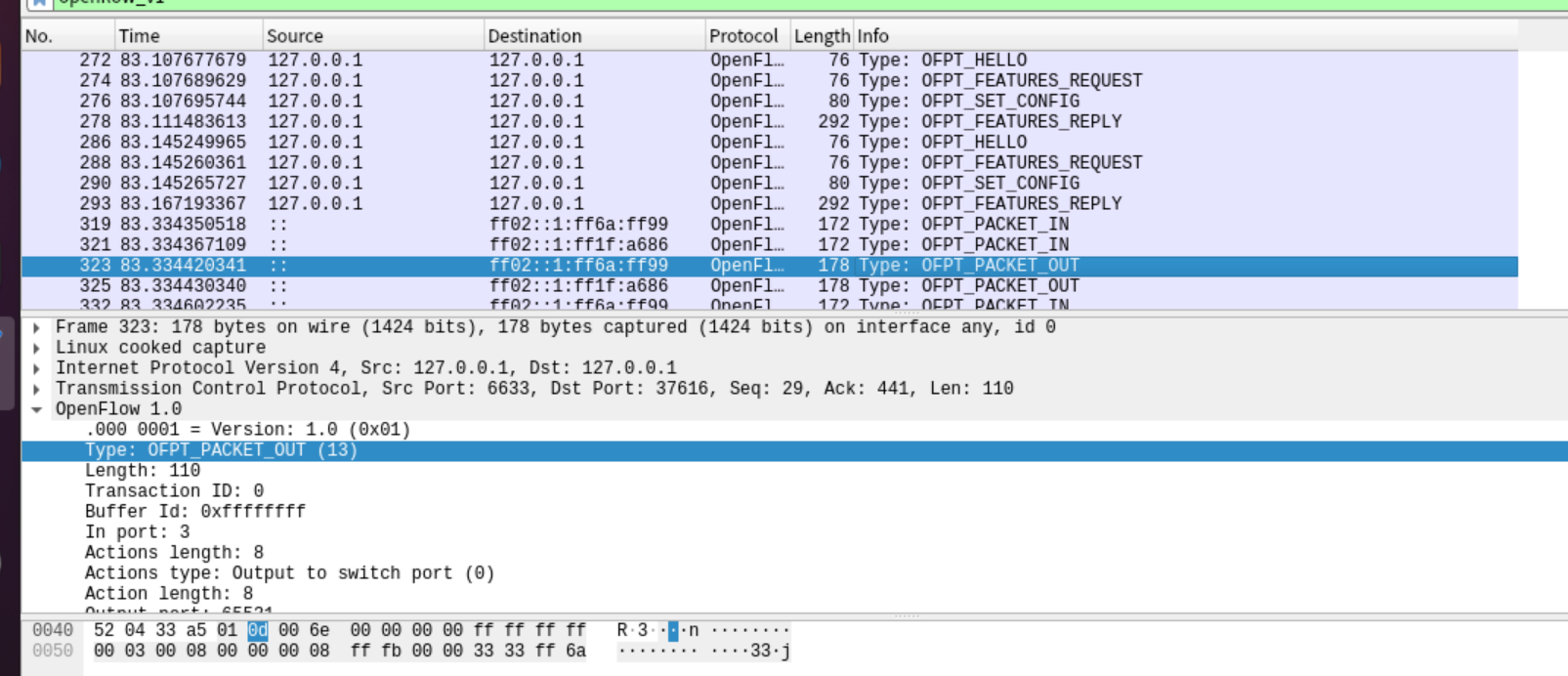
| 7.flow_mod |
分析抓取的flow_mod数据包,控制器通过6633端口向交换机37614端口、交换机37616端口下发流表项,指导数据的转发处理
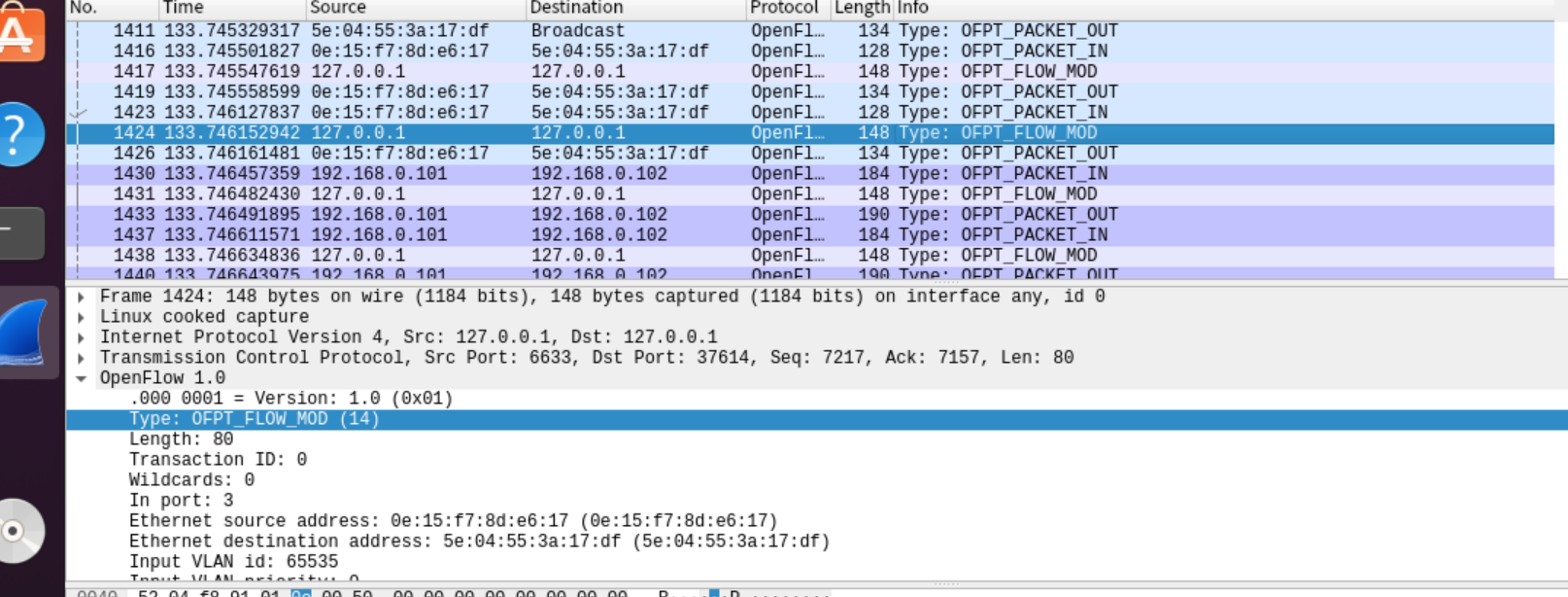
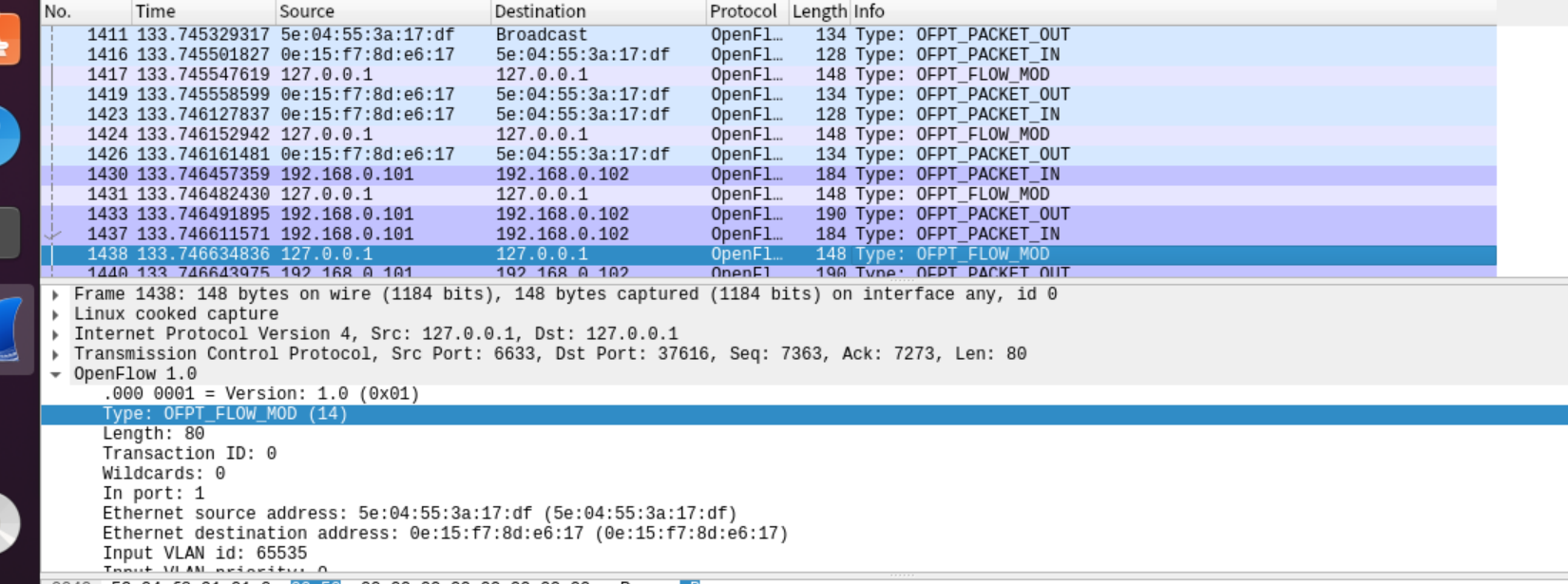
| 8.查看抓包结果,分析OpenFlow协议中交换机与控制器的消息交互过程,画出相关交互图或流程图 |
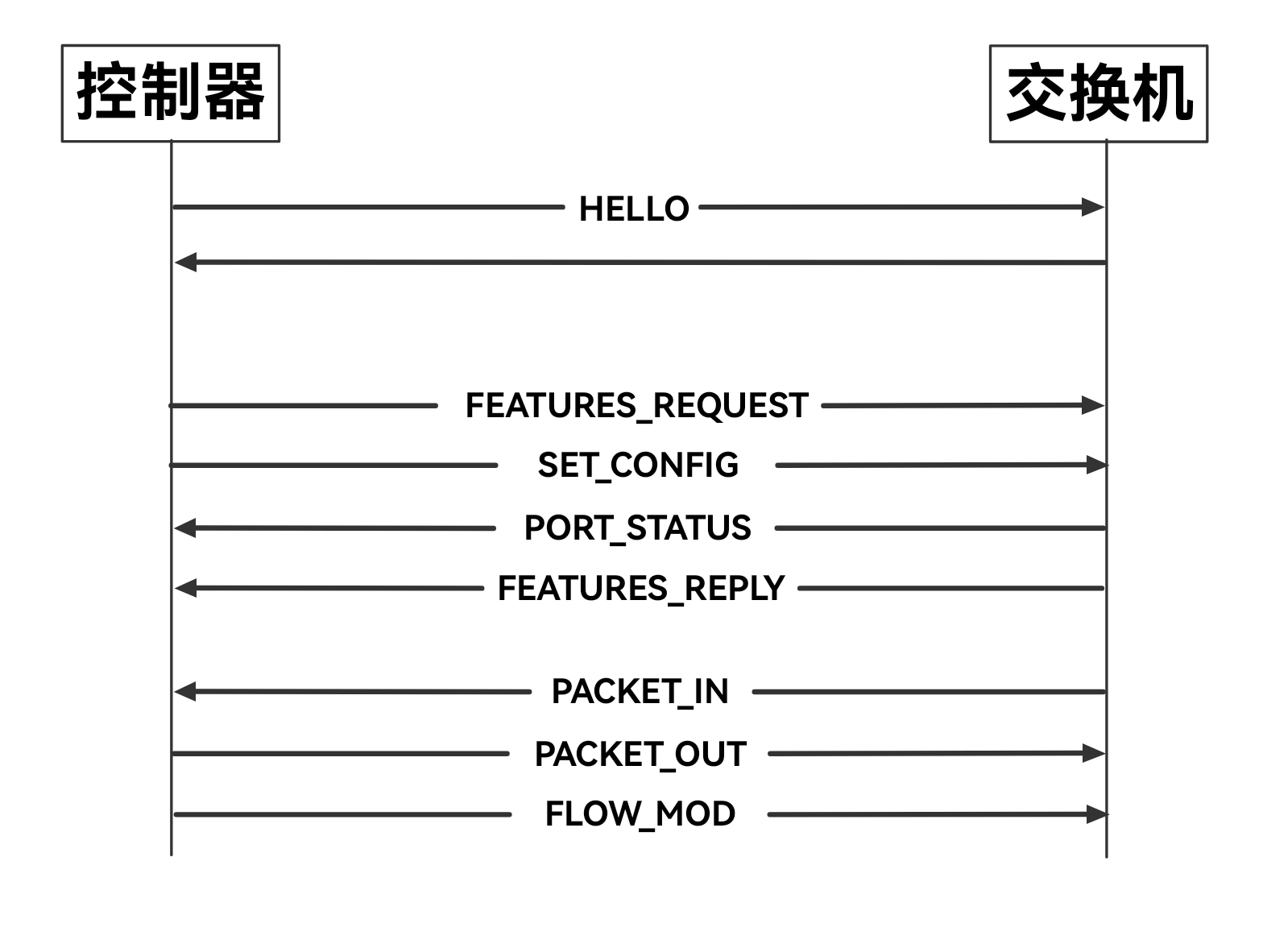
| 9.回答问题:交换机与控制器建立通信时是使用TCP协议还是UDP协议? |
答:是TCP协议
(二)进阶要求
| 1.hello |
/* Header on all OpenFlow packets. */
struct ofp_header {
uint8_t version; /* OFP_VERSION. */
uint8_t type; /* One of the OFPT_ constants. */
uint16_t length; /* Length including this ofp_header. */
uint32_t xid; /* Transaction id associated with this packet.
Replies use the same id as was in the request
to facilitate pairing. */
};
//HELLO报文中有四个参数,对应版本号、消息类型、长度及ID
struct ofp_hello {
struct ofp_header header;
};
| 2.Features Request |
/* Header on all OpenFlow packets. */
struct ofp_header {
uint8_t version; /* OFP_VERSION. */
uint8_t type; /* One of the OFPT_ constants. */
uint16_t length; /* Length including this ofp_header. */
uint32_t xid; /* Transaction id associated with this packet.
Replies use the same id as was in the request
to facilitate pairing. */
};
//feature_request的结构与hello一致
| 3.Set Config |
/* Switch configuration. */
struct ofp_switch_config {
struct ofp_header header;
uint16_t flags; /* OFPC_* flags. */
uint16_t miss_send_len; /* Max bytes of new flow that datapath should send to the controller. */
};
//set_config比header还多了两项
//flags:交换机如何处理IP分片数据包
//miss_send_len:一个交换机无法处理的数据包到达时,将数据包发给控制器的最大字节数
| 4.Port_Status |
/* A physical port has changed in the datapath */
struct ofp_port_status {
struct ofp_header header;
uint8_t reason; /* One of OFPPR_*. */
uint8_t pad[7]; /* Align to 64-bits. */
struct ofp_phy_port desc;
};
//在OpenFlow交换机中添加、删除或修改物理端口时,需要发送Port-Status 消息来通知OpenFlow 控制器
| 5.Features Reply |
/* Switch features. */
struct ofp_switch_features {
struct ofp_header header;
uint64_t datapath_id; /* Datapath unique ID. The lower 48-bits are for
a MAC address, while the upper 16-bits are
implementer-defined. */
uint32_t n_buffers; /* Max packets buffered at once. */
uint8_t n_tables; /* Number of tables supported by datapath. */
uint8_t pad[3]; /* Align to 64-bits. */
/* Features. */
uint32_t capabilities; /* Bitmap of support "ofp_capabilities". */
uint32_t actions; /* Bitmap of supported "ofp_action_type"s. */
/* Port info.*/
struct ofp_phy_port ports[0]; /* Port definitions. The number of ports
is inferred from the length field in
the header. */
};
//除了header还包括唯一ID号、缓冲区可以缓存的最大数据包个数、流表数量、功能、动作、端口等
| 6.Packet_In |
//两种情况:1.交换机查找流表,发现没有匹配条目,但是这种包没有抓到过
enum ofp_packet_in_reason {
OFPR_NO_MATCH, /* No matching flow. */
OFPR_ACTION /* Action explicitly output to controller. */
};
// 2.有匹配条目,对应的action是OUTPUT=CONTROLLER,固定收到向控制器发送包
/* Packet received on port (datapath -> controller). */
struct ofp_packet_in {
struct ofp_header header;
uint32_t buffer_id; /* ID assigned by datapath. */
uint16_t total_len; /* Full length of frame. */
uint16_t in_port; /* Port on which frame was received. */
uint8_t reason; /* Reason packet is being sent (one of OFPR_*) */
uint8_t pad;
uint8_t data[0]; /* Ethernet frame, halfway through 32-bit word,
so the IP header is 32-bit aligned. The
amount of data is inferred from the length
field in the header. Because of padding,
offsetof(struct ofp_packet_in, data) ==
sizeof(struct ofp_packet_in) - 2. */
};
| 7.Packet_Out |
/* Send packet (controller -> datapath). */
struct ofp_packet_out {
struct ofp_header header;
uint32_t buffer_id; /* ID assigned by datapath (-1 if none). */
uint16_t in_port; /* Packet's input port (OFPP_NONE if none). */
uint16_t actions_len; /* Size of action array in bytes. */
struct ofp_action_header actions[0]; /* Actions. */
/* uint8_t data[0]; */ /* Packet data. The length is inferred
from the length field in the header.
(Only meaningful if buffer_id == -1.) */
};
//包括动作列表、缓冲区ID等
| 8.FLOW_MOD |
/* Flow setup and teardown (controller -> datapath). */
struct ofp_flow_mod {
struct ofp_header header;
struct ofp_match match; /* Fields to match */
uint64_t cookie; /* Opaque controller-issued identifier. */
/* Flow actions. */
uint16_t command; /* One of OFPFC_*. */
uint16_t idle_timeout; /* Idle time before discarding (seconds). */
uint16_t hard_timeout; /* Max time before discarding (seconds). */
uint16_t priority; /* Priority level of flow entry. */
uint32_t buffer_id; /* Buffered packet to apply to (or -1).
Not meaningful for OFPFC_DELETE*. */
uint16_t out_port; /* For OFPFC_DELETE* commands, require
matching entries to include this as an
output port. A value of OFPP_NONE
indicates no restriction. */
uint16_t flags; /* One of OFPFF_*. */
struct ofp_action_header actions[0]; /* The action length is inferred
from the length field in the
header. */
};
//包括流表项标志符cookie,command代表五种操作,对应值分别为0-4,优先级等
四、实验总结
本次实验难度较易,但也遇到了一些困难,原因是自己忽略了一些细节。
遇到的困难:
1.抓包后没有出现hello
解决:先开启抓包再构建拓扑后就会在第一行出现
2.没有出现Flow_mod
解决:在终端ping一下就会出现,查阅之后了解到flow mod操作主要是有五类操作,增加、修改、严格修改、删除、严格删除,用于下发流表。
心得体会:这次实验总体感觉相对比较简单,主要是了解了OpenFlow地运行机制,和OpenFlow地消息类别和作用。通过查看OpenFlow源码更加深入了解了Openflow地工作过程。对TCP协议地应用有了更加深入理解。在这次实验中,通过抓包了解了,拓扑网络建立地全过程,和在建立过程中需要的信息。尤其对FLOW_MOD印象比较深刻。




